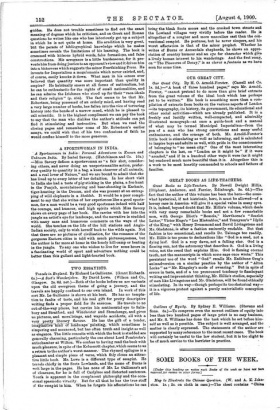GREAT BOOKS AS LIFE-TEACHERS.
Great Books as Life-Teachers. By Newell Dwight Hillis. (Oliphant, Anderson, and Ferrier, Edinburgh. 35. 6d.)—The fact that the author of this volume has been the hero—the some- what hysterical, if not histrionic, hero, it must be allowed—of a heresy case in America. will give it a special value in many eyes. It is, indeed, beyond doubt that Mr. Hillis's volume, which deals with very many remarkable books and not a few remarkable men, with George Eliot's " Romola," Hawthorne's "Scarlet Letter," Victor Hugo's "Lea Miserables," and Tennyson's "Idylls of the King," with Henry Drummond and David Livingstone and Mr. Gladstone, is after a fashion eminently readable. But that fashion is too sensational, and recalls Dr. Talmage too readily. Mr. Hillis is too prone to declarations like "God is a seed, not a dying leaf. God is a rosy dawn, not a falling star. God is a flaming sun, not the astronomy that describes it. God is a living voice, not the creed that explains Him. God is flaming eternal truth, not the manuscripts in which some sage once wrote." This persistent use of the word "God" recalls Mr. Rathbone Greg's animadversion on a similar practice by the author of "Alton Locke as "Mr. Kingsley's mode of swearing." But in spite of errors in taste, and of a too pronounced tendency to flamboyant writing and impressionist thinking, Mr. Hillis's studies, especially of men like Livingstone and Mr. Gladstone, will be found ethically stimulating. In its way—though perhaps its too rhetorical way— it is a vigorous protest against a purely materialistic conception of life.


































 Previous page
Previous page